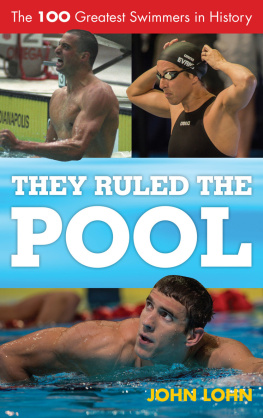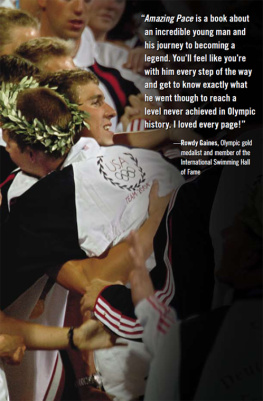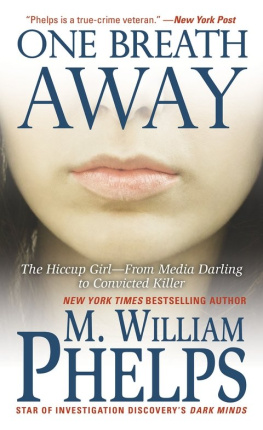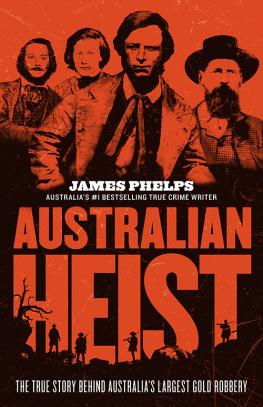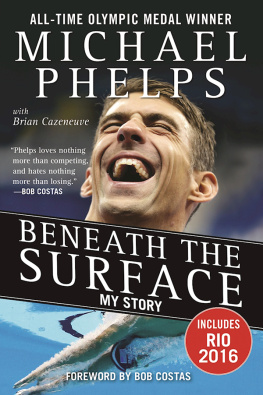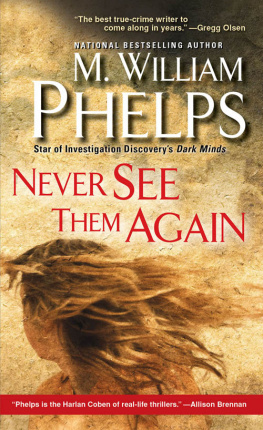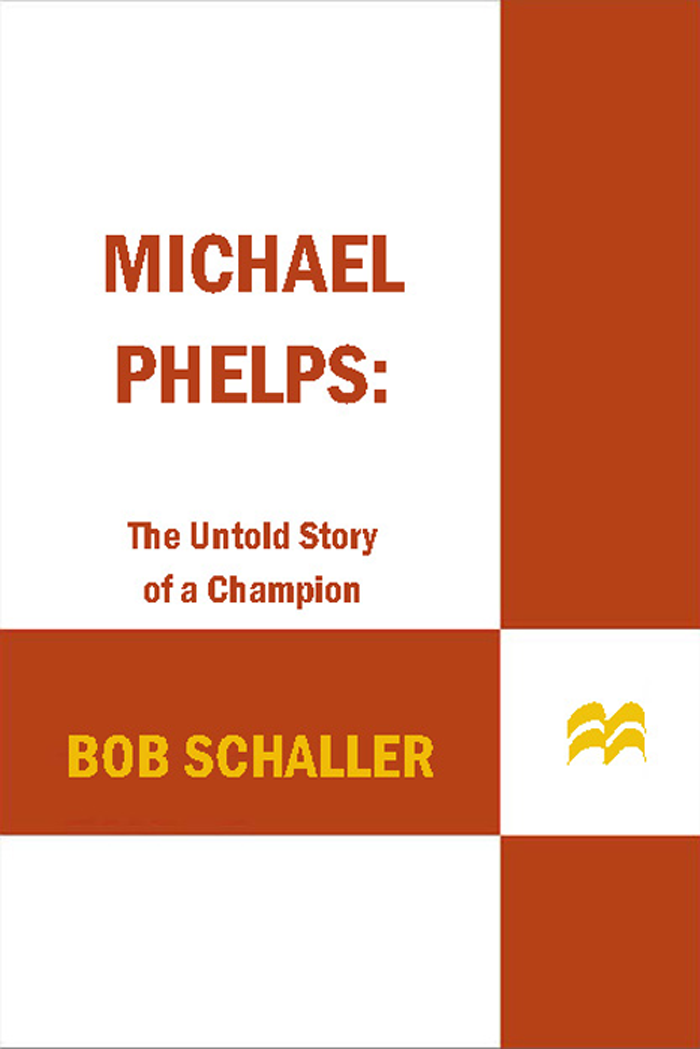NOTE: If you purchased this book without a cover you should be aware that this book is stolen property. It was reported as unsold and destroyed to the publisher, and neither the author nor the publisher has received any payment for this stripped book.
MICHAEL PHELPS: THE UNTOLD STORY OF A CHAMPION
Copyright 2008 by Bob Schaller.
Front cover photo of Michael Phelps Barbara Walton/epa/Corbis.
Back cover photo of Michael Phelps NewSport/Corbis.
All rights reserved.
For information address St. Martins Press, 175 Fifth Avenue, New York, NY 10010.
ISBN: 0-312-35737-0
EAN: 978-0-312-35737-5
Printed in the United States of America
St. Martins Paperbacks edition / November 2008
St. Martins Paperbacks are published by St. Martins Press, 175 Fifth Avenue, New York, NY 10010.
10 9 8 7 6 5 4 3 2 1
To the relay members of the 2008 U.S. Mens Olympic team, and all the men and women on the 2008 U.S. swimming team, for showing character in and out of the pool we can all be proud ofand an extended appreciation to Michael Phelps for being both superhuman, and very human.
Contents
Chapter 1: Raised by a Single Mom and
Two Amazing Sisters
Chapter 2: The Family that Swims Together:
The Push to 2000 for the Phelps Siblings
Chapter 3: The Architect Behind the Plan:
Coach Bob Bowman
Chapter 5: Becoming a Young Man:
Life at the University of Michigan
Chapter 7: Omaha, Nebraska:
No Calm Before the Storm
Chapter 8: Mark Spitz: Michael, Watch Out in the 100 Butterfly
Chapter 15: Wednesday, August 13:
Finals, 200 Butterfly and 800 Free Relay (4 200)
Chapter 16: Thursday, August 14:
No Finals, but Little Time to Rest
Chapter 17: Friday, August 15:
Finals, 200 Individual Medley
Chapter 19: Sunday, August 17:
Finals, 4 100 Medley Relay
Appendix F: June 30: A Day that Brought the World
Michael Phelpsand a Whole Lot More
Foreword:
By Jason Lezak, 2008 U.S. Olympic relay double-gold medal anchor, 100 freestyle bronze medalist
I have been a teammate of Michael Phelps since the 2000 Sydney Olympics in Australia. To see him grow as an athlete and a person through the years has been something I have enjoyed.
I really did think eight gold medals was possible for Michael. I knew there would be some tough races. I expected that 100 fly to be the close race that it was. Some said it was lucky, but the fact is that he won, and he was willing to do whatever it took to push himself to win that race that day, to claim that moment and gold medal. The irony is, no one realizes that even if he had lost that race, seven golds and one silver would still have been the best Olympic performance in the history of the Games.
What Michael did is a great accomplishment. Our entire team did a lot of good things, and a lot of us stepped up to a new level and achieved our own dreams. Aaron Peirsol had a pair of golds and silver. Brendan Hansen finished strong to help us get medley-relay gold. Ian Crocker finished with a gold. Ryan Lochte had a great Games. I had some Olympic disappointments that had me thinking about retiring after the 2004 Olympics. I am so glad I did not retire. I still felt like there was something missing. After what we did in Beijing, I feel like I accomplished something I set out to do four years ago. That does not mean I am going to retire now, because I love the sport and I love what I am doing.
The 2008 Olympics were memorable for a lot of us, and I hope all of you. I had two big goals in 2008 for Beijing. My first was getting back to winning the individual medal that I thought I would win in the 100 freestyle at the 2004 Games where I had gone out too slow in the preliminaries, and did not make the final. My other goal was to help get the U.S. back on track by winning the 400 freestyle relay. We wanted to re-establish and show our dominance in that event.
We had another event to re-establish ourselves in as a relay power, the 400 medley relay. At the 2007 World Championships in Melbourne, Australia, we missed the opportunity to swim in the final because of a disqualification in the preliminary. No one was putting the blame on anybody else. But still, we wanted to go out and show the world we could dominate.
The rest of the world is catching up to us in a lot of events. That is a good thing for swimming, because it shows that a lot more young people are swimming around the world than ever before, and are choosing swimming as both a competitive sport and a lifestyle. But it also meant in 2008 that we would have to get better.
At the 2008 Games, we certainly did not have the same dominance as we did in 2004, because back then we were three seconds ahead of everybody in the 400 medley relay. However, the Olympics are about doing your best and winning. We knew this time it would not be a cakewalk, and that several other nations would be contenders for the gold medals, and that other countries with a good chance to medal could step it up and do the best relay theyve ever done and perhaps take a gold medal.
But we were golden in all three relays. And yes, that last leg of the 400 free relay was as hard as it looked for meanchoring the medley relay was also a challenge where we met the challenge, and Im very proud to be a part of that team. It wasnt easy, but when something is worthwhile, it usually takes your best effort. Thats what we did.
Preface:
Let the Games Begin: China, 2008
At 8:08 p.m. local time on August 8, 2008, the attention of the world focused on Beijing, China.
The biggest, most populous country and burgeoning superpower cracked open its doors to the rest of the world. China largely kept its doings concealed behind the Great Wall, only allowing the outside world the occasional well-orchestrated glimpse, often through conflict about freedoms in Tibet, and even Hong Kong. Tiananmens Square in Beijing was about to be transformed from political and historical chess piece into a tourism landmark. It became the public gathering place that most would visit on the way to the Water Cube and the Birds Nest, hosts to swimming and track, respectively, at the 2008 Summer Olympic Games.
As the curtain was drawn to unveil the Forbidden City to the world, the world knew only about its most recent, most temporary import: American swimmer, Michael Phelps. His Olympic quest was its own form of dynasty, one that started internationally with the 2000 Games. As the surprise second qualifier in the 200 butterfly, after top-ranked veteran, Tom Malchow, Phelps was a gangly 15-year-old on his way to the continent where swimming is king: Australia. Down under, swimming superstars make the millions that athletes like LeBron James or Peyton Manning might in the United States.
A few months after those 2000 Olympics in Sydney, I sat down with Michael Phelps for what would be the first of several yearly interviews to talk about who he was, where he was headed, and how he would get there. His coach, Bob Bowman, was also along that day and with us for several of the other interviews that would follow in the years to come.
The 2004 Olympics in Athens, Greece, were tentatively planned as the place for Phelps coronation. He had a slim chance to equal Mark Spitzs record of seven medals, and no chance of getting eight. One of the events he was swimming was new to him; he even admitted he just wanted to swim that particular race for the experience. The world record-holder, Ian Thorpe, was competing and among the five or six better than Phelps in that race.



